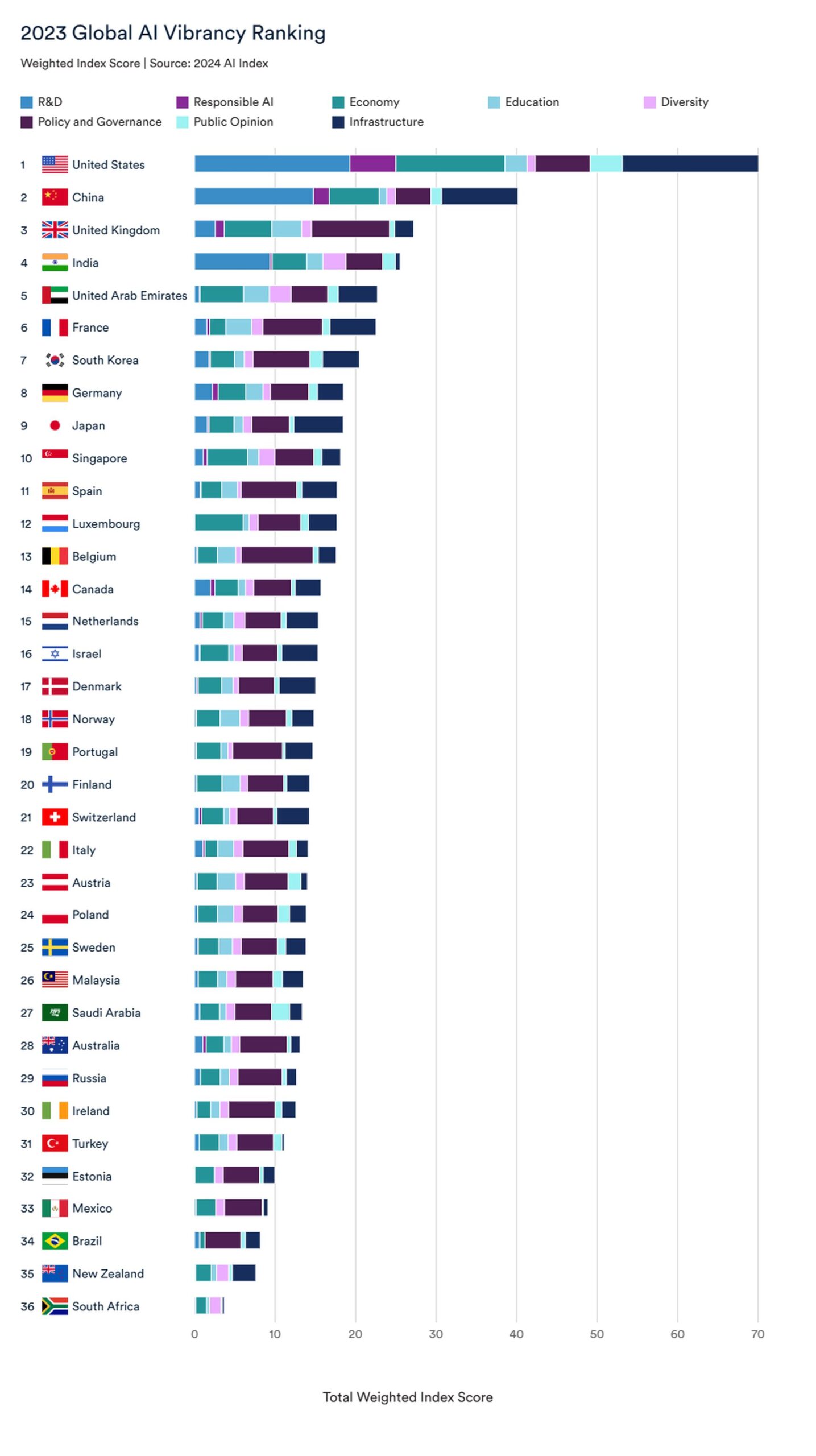The United States remains the world leader in artificial intelligence innovation, according to a newly released Stanford University index.
The Stanford Institute for Human-Centered AI’s Global Vibrancy Tool 2024 assesses AI development across 36 countries, ranking the U.S. first, followed by China and the United Kingdom.
The index measures various indicators of AI activity, including research output, private investment, and patenting efforts. The U.S. stands out with substantial investments in AI, reaching $67.2 billion last year, compared to China’s $7.8 billion. The U.S. also excels in publishing responsible AI research and hosting prominent AI companies like Google, Meta, OpenAI, and Anthropic.
Furthermore, Congress has enacted several AI-related laws, although comprehensive regulations remain pending.
U.S. outpaces China and the UK in AI race
China, while trailing the U.S., is recognized for submitting the highest number of generative AI patents globally. This patenting activity reflects China’s commitment to advancing AI technology. The Stanford report highlights China’s ability to produce AI-related publications at its universities, further establishing it as a massive player in the AI market. Major Chinese companies, such as Baidu with its chatbot Ernie, also contribute to the nation’s AI advancements.
The United Kingdom ranks third, benefitting from a strong educational system that fosters AI talent.
Notably, the UK is home to DeepMind, Google’s AI subsidiary, which has garnered attention for its innovative developments. The UK has actively participated in global AI governance discussions, including hosting the first international AI safety summit in 2023. This emphasis on AI research and policy strengthens its position in the rankings.
India follows closely behind in fourth place, attributed to its growing AI research community and increasing economic investments. The country’s public discourse surrounding AI has also gained traction on social media platforms, indicating a more engaged population regarding AI-related topics.

Rising AI investments in the UAE
The United Arab Emirates ranks fifth, driven by intentional investments in AI initiatives. Recent commitments include Microsoft’s $1.5 billion investment in the UAE-based tech firm G42, overseen by a national security adviser. This firm oversees advanced data operations and developed Jais, the leading Arabic-language AI model.
France occupies the sixth position, benefiting from robust AI policies and being home to notable startups such as Mistral. South Korea follows in seventh, while Germany, Japan, and Singapore complete the top 10.
The emergence of the European Union’s sweeping AI Act underscores a collective effort among European nations to enhance their AI frameworks while ensuring responsible use.
The Global Vibrancy Tool, relaunched this year, aims to provide a nuanced understanding of nations’ AI standings by allowing users to adjust and weigh indicators relevant to their perspectives. The tool encompasses 42 specific indicators to ensure a comprehensive snapshot of each country’s AI ecosystem.
Ongoing developments in global AI dynamics
As AI continues to rise as a crucial national interest, countries are prioritizing AI research and development to enhance their global standing. The tool not only captures current AI markets but also seeks to illuminate how these dynamics evolve over time.
Future developments regarding AI regulations are anticipated, particularly as nations evaluate their positions in a competitive global market. Improved data collection and tracking efforts are expected to supplement the Global Vibrancy Tool to enhance its effectiveness and representation of diverse global AI ecosystems.
With such efforts underway, the dynamics of AI innovation will likely remain active and pivotal in shaping countries’ economic futures. Further investigations into evolving policies and international cooperation in the AI space are ongoing.
Featured image credit: Freepik





